Nouvelle
Earth Overshoot Day
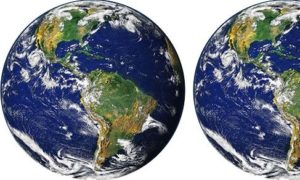
Mise à jour: 17 Jul 2023
Earth Overshoot Day marks the date when humanity’s demand for ecological resources and services in a given year exceeds what Earth can regenerate in that year. In 2023, it falls on 2 August. Here are resources on how we can #MoveTheDate.
Earth Overshoot Day
Each year, Earth Overshoot Day marks the date when we have used all the biological resources that the Earth can renew during the entire year. To determine the date of Earth Overshoot Day, the Global Footprint Network, an award-winning international research and non-profit organization, combines data and forms the most reasonable assumptions to assess humanity’s resource situation.
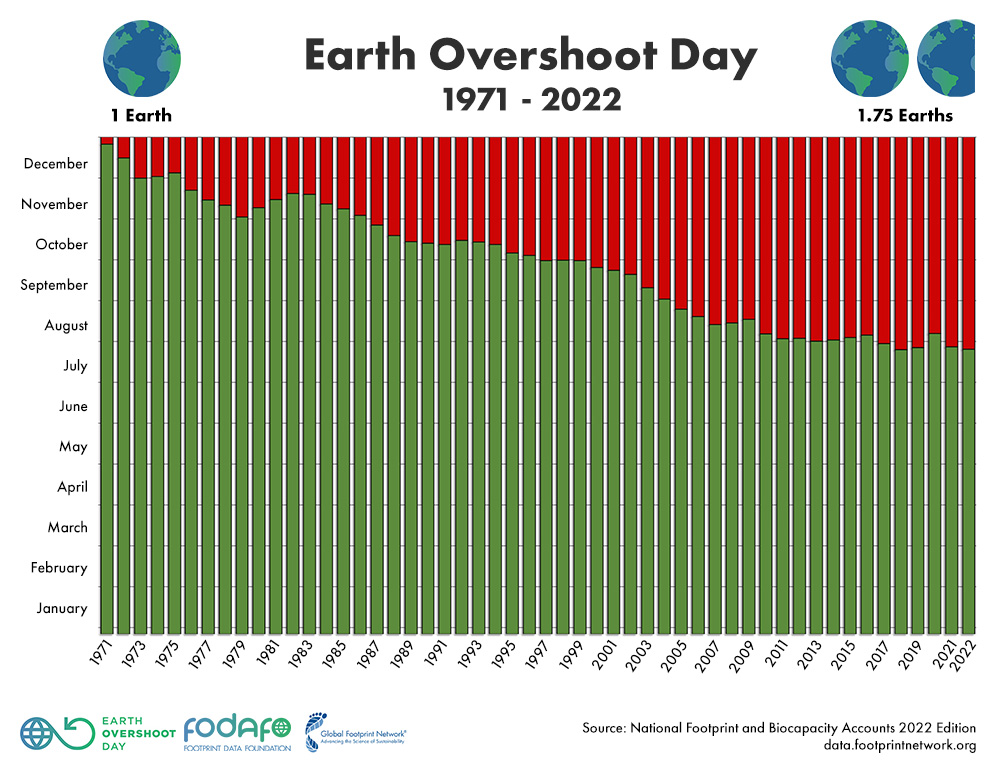
Earth Overshoot Day over the Years
- Overshoot Day 2023 | 2 August
- Overshoot Day 2022 | 28 July
- Overshoot Day 2021 | 29 July
- Overshoot Day 2020 | 22 August
Country Overshoot Days
A Country Overshoot Day reflects the ecological footprint of a country by comparing the population’s demand and the nation’s biocapacity.
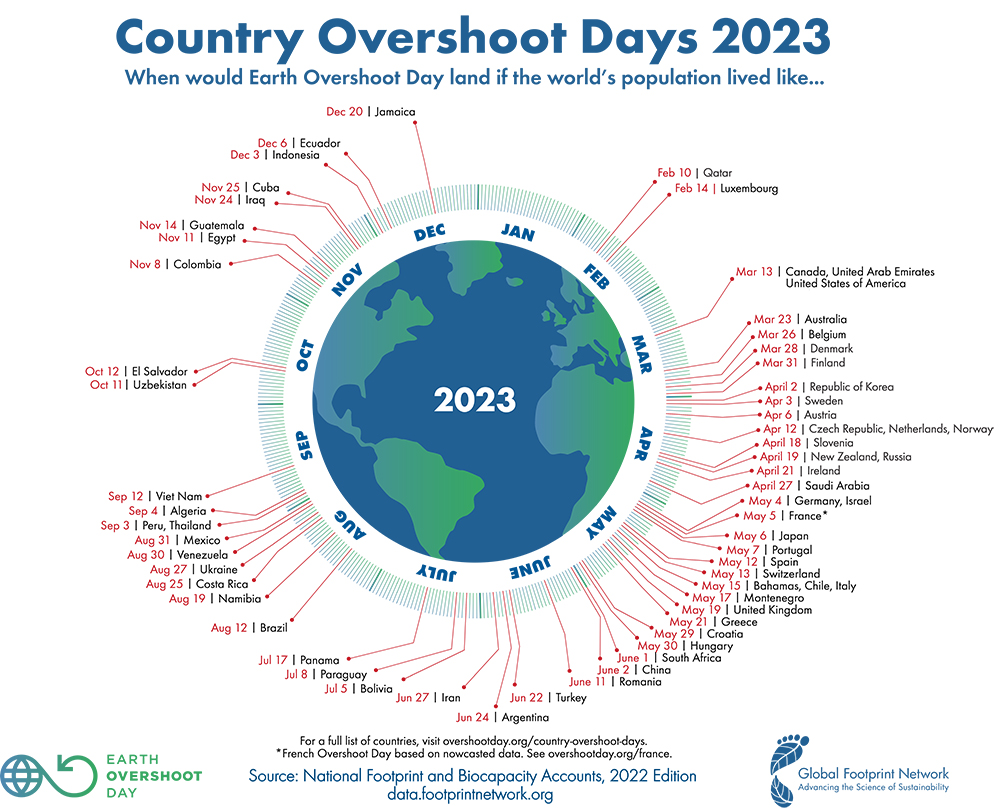
Switzerland
Switzerland’s Overshoot Day 2023 is on 13 May. From this date onwards, Switzerland is living on credit at the expense of future generations. If the world’s population had the same lifestyle as Swiss citizens, the resources of three planets would be necessary to ensure its existence.
Environmental Footprint Calculator
You can calculate your ecological footprint and see what steps you could take by answering to a quick questionnaire.
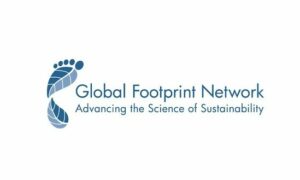
Global Footprint Calculator
The Footprint Calculator computes for an individual how many planets would be needed if everyone on Earth had the same lifestyle than this individual. In order to do so, it calculates how much biologically productive area is needed to produce the resources for the human population and to absorb its carbon dioxide emissions.
Smart Consumption Guides
Various applications and guides allow you to learn about responsible consumption and production, and change your habits. Here are some of them to start with.
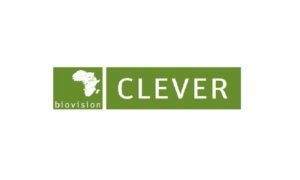
CLEVER
The Biovision Foundation has created the platform CLEVER where consumers can evaluate the sustainability of everyday consumer products and find advice to have a responsible consumption.

YUKA
The YUKA application created in France in 2017 and available in other countries including Switzerland, aims at informing consumers on the content of food and cosmetic products and guiding them towards a healthier consumption. It can help consumers to use less resources as it provides them with incentives to think about their consumption habits.

WWF Online Guides
WWF Online Guides, available in Switzerland, gives consumers eco-tips to have a responsible consumption. For example, it gives advice on how to buy seafood, fruits and vegetables, souvenirs, and information on labels, among other things.
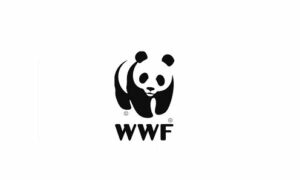
WWF Tips for a Climate Friendly Lifestyle
WWF Online guides, available in Switzerland, offer tips for daily actions and purchasing decisions to consume sustainably and protect the climate
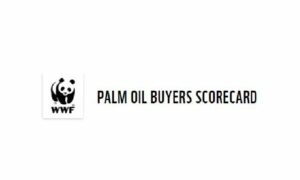
Palm Oil Buyers Scorecard by WWF
The Palm Oil Buyers Scorecard allows consumers to get information on their favorite brands to see if they are committed to a responsible palm oil future, free from deforestation and destruction of nature. It reveals information on 132 companies.
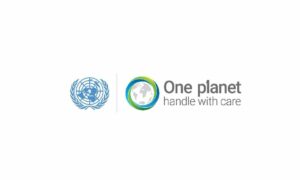
One planet network
One Planet network is a multi-stakeholder partnership, adopted in 2012, that supports the implementation of Sustainable Development Goal 12 – Responsible consumption and production – through various programs on, consumer information, food systems and tourism, among others.

Labelinfo.ch
Labelinfo.ch is a platform of the Pusch Foundation, allowing consumers to learn more on labels. Since 2015, it regroups information on the management, the environmental and social aspects, the processes and the controls of the major labels of the food sector.
More on sustainable consumption and production
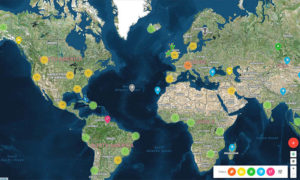
#MoveTheDate Campaign
Learn about what people around the world are sharing on social media to #MoveTheDate.

#MoveTheDate Switzerland
#MoveTheDate Switzerland is a movement providing tips and suggestions to move the Swiss Overshoot Day.
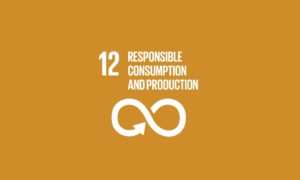
UN Sustainable Development Goal 12
Sustainable Development Goal 12 – Responsible consumption and production – aims to create a sustainable consumption and production by using less natural resources, by increasing resource efficiency and by promoting sustainable lifestyles.
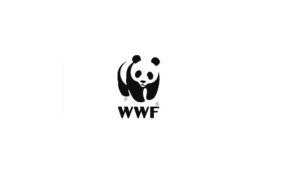
Palm Oil Buyers Scorecard
The Palm Oil Buyers Scorecard provides information on companies to see if they are committed to a responsible palm oil future.

Is Europe living within the limits of our planet?
The European Environment Agency (EEA) and the Swiss Federal Office for the Environment (FOEN), published in April 2020, a joint study assessing selected European environmental footprints based on the concept of planetary boundaries.
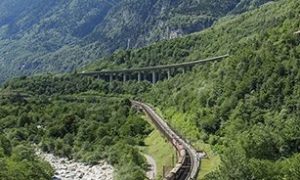
Utilization of Natural Resources in Switzerland
Discover what is happening in Switzerland concerning the use of natural resources and the measures taken for their more efficient use.
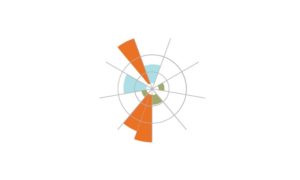
Planetary Boundaries Concept
Learn more on the concept of “planetary boundaries” from the Stockholm Resilience Centre.
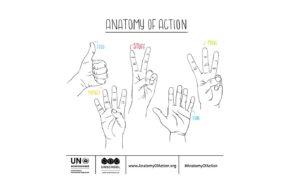
The Anatomy of Action Campaign
The Anatomy of Action, developed by UNEP and UnSchool, aims to define and communicate the most positively impactful actions we can take to contribute to a sustainable world, such as the 15 Days Challenge.
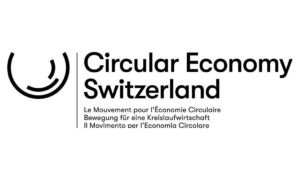
Circular Economy Switzerland
Learn about creative solutions and innovative initiatives from private companies and public organizations to make the Swiss economy more circular.
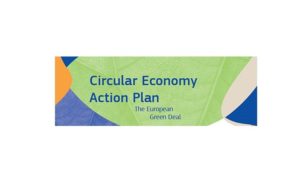
EU Circular Economy Action Plan
Within the framework of the European Green Deal, the European Union adopted a new Circular Economy Plan in March 2020.
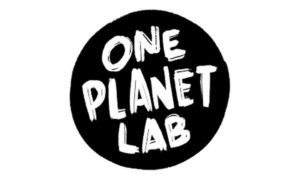
One Planet Lab
One Planet Lab supports initiatives for a future more respectful of natural resources.
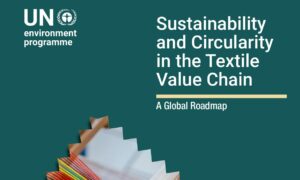
UNEP Sustainability and Circularity in the Textile Value Chain - A Global Roadmap
UNEP’s report ‘Sustainability and Circularity in the Textile Value Chain: A Global Roadmap’ outlines what each stakeholder group can do individually and collectively to reach the shared destination of a circular textile sector.

WWF Changing Fashion Report
In this report from 2017, WWF provides us with alternatives to reduce our clothing consumption and find information on the textile industry.
